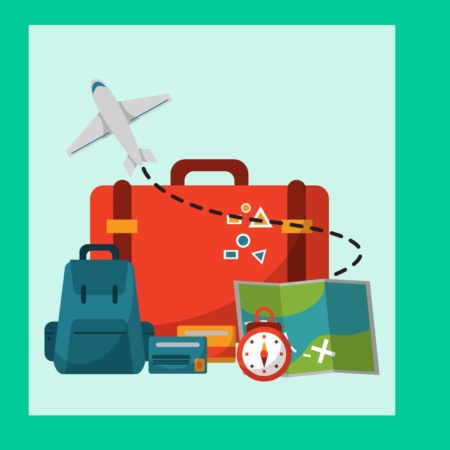Travelling with a Stoma: What to Do Before You Go

Travelling with a stoma can feel daunting, especially if it's your first time. Whether you have a colostomy, ileostomy, or urostomy, preparation is key to ensure a smooth, stress-free journey. With the right planning, you can travel with confidence and enjoy new experiences. Here’s our guide to everything you should think about before you travel with a stoma.
1. Consult Your Healthcare Professional
Before booking your trip, talk to your Stoma Care Nurse or GP. They can advise you on medications or adjustments if you’re travelling to a different climate and check your stoma to make sure it’s healthy.
If you're travelling internationally, ask about any vaccinations you may need, and whether your medications and supplies are available in your destination country.
2. Plan Your Supplies Carefully
Running out of stoma supplies during your trip can turn a dream vacation into a nightmare. Here are a few things to think about when you’re planning what to take with you:
Quantity
- Bring twice as many supplies as you think you’ll need. This includes pouches, washers, flange extenders, medical adhesive removers, and disposal bags.
- Factor in the possibility of bag changes more often due to heat, sweating, unfamiliar foods, or increased activity.
Packing
- Split your supplies between your carry-on and checked luggage in case a bag goes missing.
- Store supplies in zip seal freezer bags to keep them clean and dry.
- Keep a small kit easily accessible with one or two full changes, wipes, and a plastic bag—perfect for emergency changes on the go.
Climate Considerations
- Hot or humid weather can affect adhesive on the flange so it does not stick as well. This may mean that you have to change your bag more often.
- If you're going somewhere cold, keep your adhesive products warm to maintain flexibility (carry them close to your body or in an insulated pouch).
3. Organise Important Documentation
It’s a good idea to carry a prescription list of your medication and stoma supplies with their generic names. If you run out or lose them this can help you find them as in other countries they may have different brands to what you usually use.
Make sure you have a copy of your travel insurance policy details and your policy number. You should also keep the telephone number for your insurer’s emergency assistance line on hand just in case. If you need advice read our blog on what to look for in a travel insurance policy.
If you’re travelling to a country where English isn’t widely spoken find a few translations of key phrases like “I have a medical condition” or “I need to use a disabled toilet” in the language of the country you are visiting. You can also download our Travel Certificate that explains why you need a stoma bag in 10 different languages. This can be helpful when talking to staff at airport security and customs.
4. Plan Your Travel
If you’re travelling by air notify the airline in advance if you need assistance boarding, extra luggage allowance for medical supplies, or access to refrigeration for medications. When booking your flight ask if you can be sat in an aisle seat or near a bathroom.
If you’re travelling by road, make sure you plan for regular bathroom breaks. If you’re going by coach rather than driving yourself, check if they have facilities on board and if not, how often they’ll be stopping for a break.
5. Prepare for Different Bathroom Setups
Different countries have different bathroom standards, and some may not have Western-style toilets or convenient disposal systems.
- Bring disposable plastic bags for sealing used pouches if bins aren’t available.
- Take along toilet paper or wet wipes, as not all public bathrooms provide them.
- Consider a travel-sized deodoriser spray to manage odours discreetly.
- If you're visiting countries with squat toilets, plan how you'll manage changing your pouch—sometimes a portable changing mat or towel helps.
6. Be Mindful of Diet and Hydration
Stomach upsets while travelling are not uncommon even for people without stomas. There are many causes including the change in climate, unfamiliar foods and contamination of food and water. Before you travel identify safe foods that don’t upset your stomach or increase output in case you experience digestive difficulties.
Take care when eating street foods, raw vegetables and fruit and tap water as well as ice cubes as these can be at higher risk of contamination. Stay hydrated especially if you’re in a hot climate or you’re stomach is upset.
7. Get to Know Your Destination
Do a little research before you go and find out where the nearest pharmacy to where you’re staying is in case you need medications or stoma supplies. You can also check the availability of public toilets at places you’ll visit.
Check online forums or social media groups for travellers with stomas so you can find firsthand tips and destination-specific advice. These places can also help you learn about any cultural sensitivities related to medical conditions.
8. Pack Smart Extras
Some additional items can give you peace of mind:
- Hand sanitiser (especially in places with limited soap and water).
- Dry wipes or tissues for clean-ups.
- A travel pillow can help reduce discomfort during long journeys.
Also, bring a small mirror for viewing your stoma if you need to do changes in tight or unfamiliar spaces.
9. Practice Makes Perfect
If this is your first time traveling with a stoma, do a test run. Go for a weekend away or a day trip and see how your supplies and routines hold up. You can also practice using your travel kit and handling unexpected challenges like finding a place to change.
10. Stay Confident and Flexible
Even with the best preparation, things can go slightly off plan. The key is flexibility and confidence, if you have a leak or need to change unexpectedly, remember it happens to the best of us. Give yourself extra time, stay calm, and keep your sense of humour handy.
Traveling with a stoma might require more planning, but it doesn’t have to limit your adventures. With the right mindset and thorough preparation, you can enjoy new experiences, cultures, and connections without letting your stoma get in the way. So, pack your bags, grab your supplies, and hit the road with confidence. You’ve got this!
Share this article:
by SecuriCare Team





